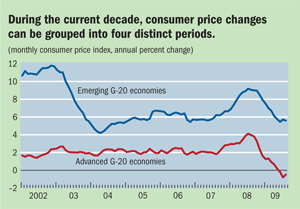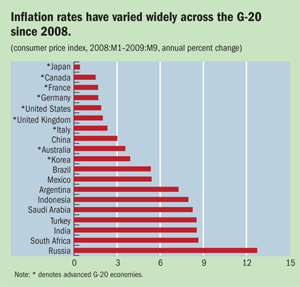Inflation Drops to Negative Territory
Finance & Development, December 2009, Volume 46, Number 4
The global crisis has caused inflation rates to fall almost everywhere
INFLATION rates were falling even while large amounts of stimulus were pumped into the global economy to combat the global financial crisis. In the Group of Twenty (G-20) advanced and emerging market economies—which account for about 80 percent of global output and trade—inflation rates have fallen dramatically, becoming negative in the advanced economies. But during the current decade, inflation has trended both up and down. Since 2002, there have been four distinct periods.
 During the early part of the decade—2002–04—there was a dramatic decline in inflation in emerging G-20 economies. The key factors behind this drop were improved fiscal performance, downward price pressures from increased global competition, improved monetary policy frameworks, and central bank independence in many countries. During 2004–07, inflation rates in the advanced and emerging G-20 economies were relatively steady, although consumer prices in emerging markets started to creep upward. In advanced G-20 economies, inflation rates hovered around 2 percent during this period, while in emerging G-20 economies rates were 2 to 3 times higher.
During the early part of the decade—2002–04—there was a dramatic decline in inflation in emerging G-20 economies. The key factors behind this drop were improved fiscal performance, downward price pressures from increased global competition, improved monetary policy frameworks, and central bank independence in many countries. During 2004–07, inflation rates in the advanced and emerging G-20 economies were relatively steady, although consumer prices in emerging markets started to creep upward. In advanced G-20 economies, inflation rates hovered around 2 percent during this period, while in emerging G-20 economies rates were 2 to 3 times higher.
 In the next period, inflation in advanced and emerging G-20 economies—pushed up by a steady run-up in commodity prices that started in 2002 and a spike in energy prices in 2008—peaked at 4.1 percent and 9.2 percent, respectively, in July 2008.
In the next period, inflation in advanced and emerging G-20 economies—pushed up by a steady run-up in commodity prices that started in 2002 and a spike in energy prices in 2008—peaked at 4.1 percent and 9.2 percent, respectively, in July 2008.
But then commodity prices collapsed in the middle of 2008 and the global financial crisis hit in September 2008. As a result, inflation in the advanced G-20 economies has since fallen below zero—to –0.3 percent as of September 2009. In emerging G-20 economies, inflation is at 5.4 percent.
Across the G-20 countries, inflation rates have varied widely over the past year and a half. At the low end is Japan, with an average annual inflation rate of 0.3 percent, while Russia has the highest inflation at 12.6 percent. Advanced G-20 economies are clustered at the lower end of this range. According to the IMF’s latest World Economic Outlook, inflation in advanced economies is projected to be close to zero in 2009 and to grow to about 1 percent in 2010. In emerging economies, inflation is forecast to be about 5 percent in 2009–10.
About the database
The G-20 consumer price index (CPI) series are available at http://financialdatalink.sharepointsite.net/default.aspx, the website of the Inter-Agency Group on Economic and Financial Statistics, which is hosted by the IMF. The database includes data on the financial, external, and real sectors, and market indicators. The euro area CPI was excluded from the G-20 country analysis to avoid duplication. For Argentina, the database includes official reports of inflation. Private analysts estimate that the CPI inflation has been considerably higher. The Argentine authorities have created a board of academic advisors to assess Argentina’s CPI.


